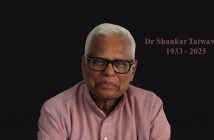As we reflect on 2020, most of us will forever remember “pandemics”. Plural because there were numerous forms of malaise that affected the world. The sudden viral plague that no one foresaw but also destruction that humanity brought on itself and the world. Even if some these, are the result of nature, we cannot deny that other problems are in no small part caused by the human ignorance, pursuit of material wealth, power, greed and superficial happiness.
Thus, we begin 2021 in search of solutions. We have some fragile promise of a suite of vaccines as one part of the solution. There must however be more wide-ranging and sustainable solutions for the broader problems we face.
Looking forward with genuine hope, 2021 brings us an opportunity to introspect and define the kind of post-pandemic world we want for future generations. For this, in addition to the HSS (UK) vision, mission and methodology, it is important we consider ‘sanskār’ which is a central tenet of HSS (UK) methodology. ‘Sanskār’ is a process, which transforms a person into a higher thinking state by diminishing the existing negative mental tendencies and by inculcating virtues, values and qualities that makes one more dynamic, modest, duty conscious and responsible towards oneself as well as society. The world needs dedicated workers and leaders who subscribe to this to be involved in defining both the vision and solutions for a sustainable future.
This HSS (UK) perspective examines both our needs for the future and perils of ignoring the concept of sanskār.
Need for big ideas
There is a clarion call for big ideas. Innovative ideas to improve life at home, work and everywhere in between. Leaders from the world of science, technology, business, politics and academia have been highly sought after for their big ideas which have ranged from transformation, servant leadership, social justice to going green and global co-operation. Though these ideas are noble and those advocating genuinely believe them to be new, it is noticeable that people remain anchored by whom they chose to ask or listen to for these big ideas. Whilst social media and digital mediums have provided wider opportunities for new voices, the reality is that the usual suspects with vested interests or those backed by money remain coveted or promoted by most media platforms.
This anchoring of ideas from a traditional or vested pool of people and institutions means that there are blind spots and the biggest blind spot is that too often the Hindu voice and values are missing (notwithstanding that Hindus constitute one sixth of humanity). This is a real danger if we are seeking sustainable solutions that will have a universal benefit. For those that feel this is Hindu proselytization or a claim of superiority it is not. For Hindus the values which they derive from sanskārs are fundamental and time-tested and it does not matter how one chooses to label these values, virtues or sanskārs as long as the essence is understood. In the same vein though, an idea should not be given more weight simply because of better marketing, PR or sometimes simply an accepted language form. Whilst these ideas may lead to more perceived success and following, the danger in values without the right mindset and experience (gained from a rigorous holistic study and practice) may lack the same integrity or longevity. This combination of mindset, values and experience is what makes sanskār so fundamental to our philosophy and everything we do.
Whilst space and time does not allow for an in-depth analysis of all our sanskārs here, indeed a lifetime is not enough, if we really want 2021 to be the start for finding more sustainable solutions, we must understand the integral nature of the values/virtues that are instilled through sanskārs.
Dangers of big ideas sans sanskārs
HSS (UK) philosophy is that without sanskār, mindsets are not aligned and this is necessary for purposeful solutions. To demonstrate this, let’s consider one of the big ideas set to deliver solutions. The mantra of diversity and inclusion is increasingly becoming vogue in the Western world. Empirical and qualitative data has been expounded and movements have led to measurable change in policies and even legislation. The concept is noble and undoubtedly correct, but it is not new and lacks integrity without real acceptance from a mindset perspective. It remains a PR mantra. One only needs to look at how the FTSE companies have reacted – they all produce annual reports with strong statements to satisfy their institutional investors and all proclaim some affinity through their policies or values statement to D&I. In reality, studies have shown that practical change has been slow and sometimes begrudgingly accepted as a tick box exercise.
Take another example the Premier League and FA ,who now expect players to kneel at the beginning of matches to demonstrate their support for black lives but there is no evidence that attitudes to black players has changed. Nor from an overall equality perspective, has there been progress in including any Indians or even Asians on or off the pitch. Even worse, the former FA Chairman was criticised for stereotypes of Indians which he used to justify the lack of numbers. Further reports of negative comments by many at different levels about other groups suggests that the bending of the knee is simply an act to pacify and portray an image of fairness, that is not backed by real mindset change.
Hollywood too, arguably with use of the most powerful tools for persuasion, has seen its actors, directors and producers use platforms including the Oscars and films to promote notions of equality. Movies like Blank Panther and Wonder Woman were praised for changing the mould and ushering a new age of movies and opportunities for black people and women respectively. Again, an honourable concept but it is notable that very little has been talked about the lack of any proper representation of people from Indian background. With exception of films that are based on fictional or historical Indian characters (although, even Gandhi was played by a non-Indian), across the slate of Hollywood and British films, the token Indian is usually an IT guy or a background worker reflecting the same stereotype displayed earlier. Perhaps most indicative of this major blind spot is one of the biggest blockbusters of our times, Avengers: Endgame. In this completely fictitious world where universal unity is required and even aliens are represented and important, there were more green people than there were Indians on screen!
The above is not to shame anyone but to highlight the problem that even noble objectives and big ideas can misfire if they are based on narrow thinking or singular activism rather than holistic deliberations and endeavours. Notions of D&I have unfortunately created polarised lobby’s and even identity politics that actually divide society. Instead of uniting people and organisations to achieve fairness, we have a situation where the loudest voices are listened to without consideration of the views of others who may also be victims but choose not to lobby or are not invited to the debate. Herein, lies the danger of solutions deriving from big ideas sans sanskār. It results in a lack of mindset alignment and blind-spots which means we may, in the short term appear to fix one problem only to create another in the future, potentially at the expense of those we ignore or even those we seek to help.
How are sanskārs different?
To understand how our sanskārs not only enable but instil a more holistic and universal mindset, let us re-evaluate the concept of D&I through the lens of Hindu philosophy. The concept is articulated in many different ways from the “ekatmata stotra” which reminds those who recite it that the whole universe is one and actually says “sa eka eva prabhuradvitīyaḥ”(The divine/timeless truth/the omnipotent is only ONE despite diversity of expression and paths). The concept and regular practice of reciting nurtures a mindset and obligation of unity irrespective of differences. Thus, it is more than a slogan but a duty which is embedded into the psyche. The same concept which sums up the limitless open mindedness that is required of the Hindu mindset is also expressed in Rig Veda – Aano bhadra krtavo yantu vishwatah’ (meaning: Let noble thoughts come to me from all directions). (Rig Veda 1.89.1).
Apart from regular recitation, our rituals, symbology, tradition and cultural experiences reinforce this concept. History too has shown that Hindus rather than being constrained by labels or prescriptive policies have embraced or discarded practices that go against the ultimate universal good. Indeed, Hindus are taught to continually introspect and question practices which have triggered reform movements periodically and resulted in religions and sects like Buddhism, Sikhism, Jainism and Arya Samaj which endeavoured to calibrate societal practices for the necessary time. True, this has not always been a quick or sudden change and there are interpretations of traditions which have unfortunately been wrongly embraced or articulated. But to equate that with sanskār or Hindu philosophy is a false equivalency born out of ignorance or worse to disparage Hindu philosophy. These ‘bad’ traditions which have crept into the society and wrongly labelled as part of Hindu philosophy are the effect of bad actions which became habit. This is the subject of another discussion.
Many examples other than D&I, highlight how noble concepts lacking the right mindset have been articulated as big ideas or solutions. For example, the practice of Yoga, Ayurveda, or Dhyana (meditation) some of which were once ridiculed or even banned have now been repurposed and relabelled. Whilst the new forms may still have some benefits, as is shown by the concept of D&I, they may lack the integrity and longevity that comes with the holistic and time-tested nature of their original forms. Perhaps, what is more insidious is that the new forms backed by big data and a lot of PR, makes Hindus doubt, question or forget the truth and value of our sanskārs. The problem is not usually in the idea (new or relabelled) but the following of solutions because they are quick and emotional attachment to a rhetoric based on singular propositions. Big ideas that lack the right sanskārs will come with major blind spots. This not about faith or religion but about a mindset and process which enables us to earnestly seek out sustainable solutions.
So what must we do?
Our clarion call at the beginning of 2021 is to personally dedicate time to understand and develop mind and body through sanskārs. Each one of us must endeavour to study, practice and articulate our sanskārs in a way that may help all achieve sustainable solutions. We must also be involved in the discussion of big ideas so that finding sustainable solutions are driven by holistic thought. The world has an opportunity to reset the narrative. That narrative must not lack a Hindu voice so in the words of Swami Vivekanand, let’s take a pledge in 2021 to “arise, awake and stop not till the goal is reached.”




